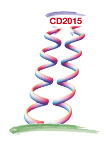Speaker
Albert Feijoo
(University of Barcelona)
Description
The meson-baryon interaction in the S=-1 sector is studied by means of a chiral SU(3) Lagrangian up to next-to-leading order, implementing unitarization in coupled channels. The parameters of the Lagrangian have been fitted to a large set of experimental data in two-body channels. We focused on K- p --> K Cascade reactions because they show the strongest sensitivity to the next-to-leading order (NLO) coefficients, due to the zero tree level contribution of the leading-order terms. As we will see, the leading order Lagrangian, even taking into account the contributions via unitaritzation, can not build enough strength to reproduce the experimental data. Thus, NLO corrections are absolutely mandatory in the K Cascade production channels. In order to improve the the description of the total and differential K- p --> K Cascade cross sections, and to analyse the accuracy and stability of the obtained NLO parameters, phenomenological contributions of massive high spin resonances in K Cascade channels have been introduced and studied. The resulting K Cascade interaction has been also applied to study of the decay process $Lambda_b -> J/Psi K Xi, which can be studied by the LHCb Collaboration
Primary author
Albert Feijoo
(University of Barcelona)
Co-authors
Prof.
Volodymyr Magas
(Universitat de Barcelona)
Prof.
Àngels Ramos
(Universitat de Barcelona)

